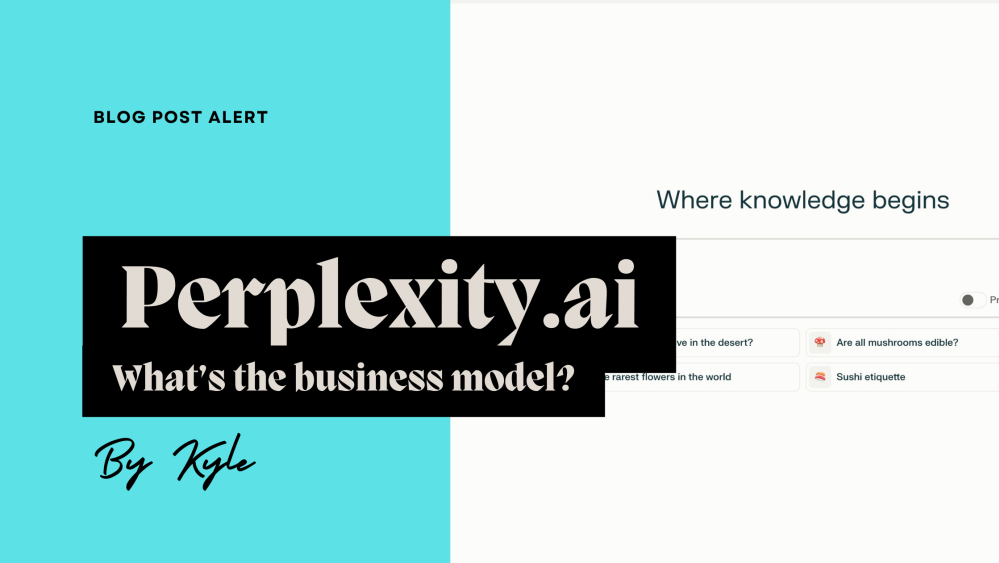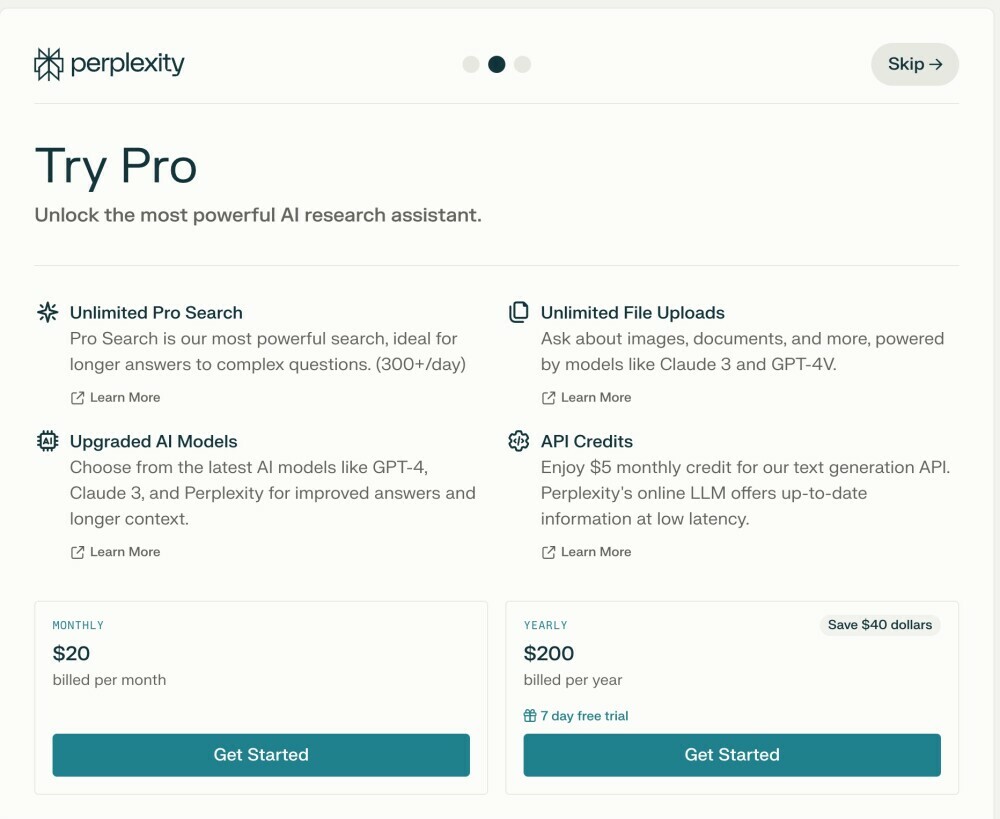
Perplexity.ai is gaining a lot of traction these days, it is a “new age” search, that utilizes AI to efficiently respond to all search queries. This is something that has been attempted by both Bing search as well as Google, but the question is how does Perplexity.ai plan on making money (and repaying investors the $100 million already committed).
Let’s look at a few strategies that Perplexity.ai is already using, and may consider utilizing as they progress to establish a solid revenue model around their service.
The Freemium Business Model
Perplexity AI’s business model, which hinges on the freemium concept. Now, what is a big draw for any digital service? Free access. Perplexity knows this and has smartly leveraged a Freemium Model. This means they give you the basic search functionalities without reaching for your wallet, but there’s a twist: if you want the souped-up features like API access and the ability to upload and search files, you’ll be looking at their “Pro” mode.
 The critical element here is the balancing act between providing a completely free service that’s genuinely useful and a more advanced, paid version that packs a punch for those power users out there.
The critical element here is the balancing act between providing a completely free service that’s genuinely useful and a more advanced, paid version that packs a punch for those power users out there.
The Freemium Model serves a dual purpose. It’s saying, ‘Hey, come on in and try this fantastic AI search engine,’ and then it’s also turning to a smaller group and adding, ‘But if you’re serious about going pro, this is how.’ This is a similar model leveraged by ChatGPT, Claude and other engines, with a very similar price point ($20 per month).
Opting for a Pro account may currently cover advanced features, but as Perplexity grows to meet investor expectations, they’ll need to maintain, or even beef up, this two-tier system to keep fuelling the revenue engine. If they Pro memberships are not servicing the high costs of running the technology behind their service (employees, high costs of server power, etc), then this could be their downfall.
Ad Based Strategy. Aligning Ad Revenue Beside User Trust.
So, Perplexity AI’s freemium model hooks you in, but how does the company plan to keep the lights on without charging every single user. What is their monetization model for the people that simply use their search.
That’s where advertising strategies come into the picture.
Let’s break down how Perplexity AI might tap into advertising without derailing the trust of its user base.
- Related Questions. Imagine you’re using Perplexity AI and see a section with questions linked subtly to brands. These could be brand-sponsored content, posing as helpful add-ons. It’s a bit of a dance between providing value and promoting a brand.
- Sponsored Ads. Perplexity AI could likely edge toward a model similar to Google Ads, where companies pay for sponsored ad inclusion under specific keywords. This could satisfy investor demands for a robust revenue stream while still prioritizing user experience. This is resource intensive to set-up an ad network like this (and attract advertisers), so this model is a big undertaking.
In my opinion, the key lies in not letting ads compromise the integrity of the search results which you are seeing in Google these days, which is riddled with “sponsored” ads. Sometimes you see up to FOUR Sponsored ads before you see a natural listings.
Users come for the answers, not the ads, and Perplexity AI has to remember that. The goal is to keep those ads relevant and unobtrusive to maintain the trust users have in the service.
As Perplexity AI considers this route, there are some hurdles to clear. One of them is the ongoing question of user trust. Can Perplexity AI introduce ads without losing the loyalty of its users? That’s a big ask, considering how ad-heavy platforms can turn off users.
However, with the right strategies in place…they may be able to get away with ads.
Is the Long Game Distribution and Data?
I don’t believe Perplexity AI is playing a short-term match; they are strategizing for sustainable success. By providing free access to its chatbot services, the company welcomes a broad user base. This inclusivity is a calculated step towards gathering valuable user data.
There are other services that are competing directly with this though, including ChatGPT (OpenAI), Gemini (Google), Grok (X.com), and Claude (Anthropic).
Perplexity AI needs to insure the service remains accessible and user-friendly, and void of the nuances in other search platforms (and AI gen platforms) that frustrate end users. They are after long term users, and that has to be a focus as they move forward. Regular engagement breeds familiarity, and with familiarity comes trust—a cornerstone for any company eyeing longevity in a VERY crowded space and a space with very deep pockets.
In the ever-evolving world of tech, where investors keep a keen eye on returns, Perplexity AI must walk a tightrope. The company needs to ensure that its revenue model blossoms naturally from its user-focused garden, rather than imposing a rigid structure that might stifle the very growth it seeks to nurture. It’s going to be quite the dance of monetization and user satisfaction, and Perplexity AI is poised to sway to the rhythm of the market’s demands without skipping a beat on the user experience.
I would love to hear your thoughts on this. Drop your comments, questions, and feedback below. Also, as an affiliate marketer and an online business owner, is there going to be opportunity to build and grow a business online through potentially ads, or other ways to get indexed? Time will tell.

Such an insightful exploration into the monetization strategies of Perplexity AI! As a mentor and coach in the affiliate marketing realm, I’m always fascinated by innovative revenue models. How do you typically guide your readers or clients in navigating the delicate balance between user experience and monetization strategies? Looking forward to hearing your perspectives on this!
It’s great to hear from someone who’s also fascinated by innovative revenue models Heather…it is definitely an intriguing space. Navigating the balance between user experience and monetization strategies is indeed a delicate task, but it’s crucial for sustainable growth.
Here’s is the approach that I have always taken in business:
#1 User First Approach: Always prioritize the user experience, they are ultimately your “customers”…even when they are not paying. No amount of monetization justifies driving away users due to intrusive ads or overwhelming sales pitches. It’s about finding what adds value to the users, while also contributing to revenue.
#2 Transparent Communication: Be upfront about how you monetize your service. You cannot slip in paid aspects, without informing your end users. Users appreciate that level of transparency and are more likely to support platforms that aren’t trying to subtly manipulate them. This builds trust and long-term engagement.
#3 Diversify Revenue Streams: Don’t rely solely on ONE method of monetization. Explore several different strategies like affiliate marketing, premium memberships, and even ad placements, but always in moderation and aligned with the user’s interests.
#4 Feedback Loops: Regularly gather and analyze the feedback that you are getting from your users/visitors. Understanding what users appreciate or dislike can guide you in fine-tuning both new features and existing monetization models within your business.
By following these principles, you can maintain a healthy balance between earning revenue and providing a great user experience. I hope this offers you some perspective here!
Hey Kyle,
Examining the business model of Perplexity AI is really fascinating. The conversation about its revenue strategies and market positioning could be further enhanced by addressing a few questions during the discussion:
First, how does Perplexity AI ensure that, as user needs and technology costs change, its freemium business model will remain viable?
Second, how does Perplexity AI intend to draw in and keep advertisers while keeping a user-friendly platform, given that advertising makes up a sizable portion of its revenue strategy?
Thirdly, what unique qualities set Perplexity AI apart from competitors such as Google and Bing in light of the competitive environment?
Fourth, how does Perplexity AI intend to maximize its business goals while ethically utilizing user data?
Finally, as Perplexity AI grows its user base and operations, what are the long-term implications for user privacy?
Potential customers and investors may find these inquiries helpful in determining the ethics and practicality of Perplexity AI’s business plan.
Hey Sara,
Let’s look at your questions here, you definitely bring up some very interesting topics.
Freemium Viability: To ensure the freemium model remains viable as user needs and technology costs evolve, Perplexity AI will likely need to continuously innovate and perhaps adjust its premium features (make them more expensive). Offering new services may also be an option, along with leveraging things like API that anyone can use (OpenAI’esque) and likely ads. The reality is they are relying on VC funding right now to run their business.
Attracting and Retaining Advertisers: To attract and keep advertisers while maintaining a user-friendly platform, Perplexity AI really needs to create a balance between non-intrusive ad formats and providing advertisers with valuable data (results), all while keeping simplicity in their design. Time will only tell on this, but they are doing a good job currently.
Competitive Edge: What sets Perplexity AI apart from giants like Google and Bing could be their specialized AI-driven features, user-centric design, or perhaps a unique approach to data privacy. These traits could appeal to users looking for a new type of search experience, something that has been “wide open” for the taking for quite some time, but they are also trying to take on a behemoth in Google that has 25+ years of experience in the search space…and they are progressive.
Ethical Use of Data: Perplexity AI should commit to transparent data usage policies, invest in secure data practices, and perhaps engage in regular audits to ensure compliance with global standards. People don’t really trust the big tech companies based on their data, and how it is used. So this could offer them a competitive advantage indeed.
User Privacy Long-Term: As the user base expands, maintaining privacy will become increasingly complex but essential. Implementing stringent data protection measures and staying ahead of privacy legislation can help mitigate potential risks of breeches, and creating worries amongst it’s users.
Thanks for sharing your thoughts (and questions). There are many currently with Perplexity.AI and how they are going to monetize their business properly, while maintaining quality and trust. It will be interesting to see how this shakes out!
HI Kyle!
This was a very interesting read on Perplexity AI. I had never heard of it before. When you mentioned that they had the Freemium model, I immediately thought that was much like Facebook, Google, LinkedIn or any number of platforms where basic usage is free. Though free, these platforms still make billions of dollars. Though Perplexity AI could charge for advertising, you laid out concerns that they would need to watch for.
Do you think Perplexity AI can be an important tool for the affiliate marketer?
– Scott
Facebook isn’t really freemium, it is ad supported. They generate their revenue by offering specific data to advertisers (sell information), and then advertisers place hyper targeted ads, Facebook makes money.
Perplexity has an advanced service, which they charge $20 monthly…much like ChatGTP does, and much like Claude does. I do feel they are going to soon integrate a similar ad model though as Google, with sponsored ads along side the search results.
Perplexity doesn’t offer a lot of value to affiliate marketers….yet. But stay tuned on that Scott, I will definitely be keeping you in the loop.